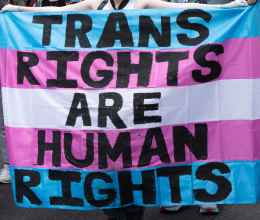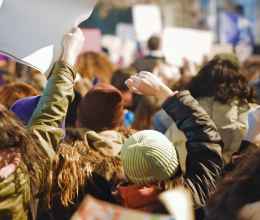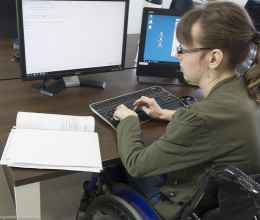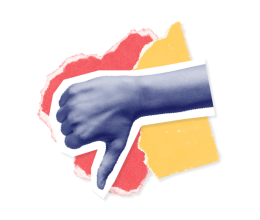
January 22 is Trans Prisoner Day of Solidarity and Action, and there has never been a more important time to commemorate it. Transgender people in prison are some of the most marginalized people in our society, subject to both anti-trans policies and procedures and the dehumanizing conditions of imprisonment. Legislators across the globe are codifying anti-transness into law, and the U.S.—and Florida especially—are leading the pack.
One of the countless people devastated by these anti-trans policies is Reiyn Keohane, a trans woman incarcerated in a male prison in Florida. For years, she received medically necessary hormone replacement therapy and clothing and grooming options that aligned with her gender identity. But on September 30, 2024, the Florida Department of Corrections (FDOC) abruptly changed its policy for trans inmates, stripping away clothing and grooming accommodations and creating requirements that essentially ban hormone replacement therapy. Prison staff threatened disciplinary action against anyone who refused to comply with their new policy.
Despite previously acknowledging that gender-affirming care is a medical necessity, Florida prisons are now in the process of removing much of this life-saving support to Keohane and countless other trans inmates, citing a state statute banning the use of state funds for “sex-reassignment prescriptions and procedures.”
Codified in 2023 by Florida’s SB 254, this restriction on government funding for gender-affirming care for trans people in state custody was passed alongside several other explicitly anti-trans laws that limit and even criminalize gender-affirming care far beyond prison walls, particularly for trans youth and those on Medicaid.
The government’s refusal to provide basic gender-affirming care to incarcerated trans people like Keohane is motivated by the very same political actors and ideologies as the many other oppressive policies being proposed and passed across the U.S. From restrictions on gender-affirming care to the censorship of “woke” and DEI-related content in schools and even the criminalization of abortion, these policies—and the fights against them—are deeply connected.
Extremist politicians and their supporters invested in maintaining the status quo are the primary backers of oppressive policies like the ones targeting trans people in prison. They argue that their policies will protect women and children, parents’ rights, family values, and even governmental spending. While some may truly believe these arguments, most mainstream discussions of these issues leave out a crucial component: the primary goal of these policies, and the ideologies behind them, is to make trans people, incarcerated people, Black and brown people, immigrants, abortion patients, and so many others into scapegoats for the everyday struggles our society is facing.
By focusing on sensationalized issues and fanning the flames of culture wars, extremist politicians and the ruling class can avoid taking responsibility for their role in the cost-of-living crisis, climate emergencies, and the instability of our local communities. And by capturing the country’s attention with constant controversy, the political and economic elite can divert people’s rightful anger at their circumstances away from the structural causes, and toward vulnerable groups, hateful stereotypes, and reactionary policies.
Trans people, people in prison, and other marginalized groups serve as canaries in the coal mine; they warn us of the dangerous political direction we are heading. Right now, the government is testing the waters for its most oppressive policies—seeing what it can get away with when the targeted group is demonized and dehumanized. If we allow the state to deny basic resources and life-saving medical care to incarcerated trans people like Reiyn Keohane without putting up a fight, it will be that much easier for them to do it again and again—to steal away more and more of our autonomy and freedom.
The good news is this: if we can succeed in resisting even just one of the violent and oppressive attacks coming our way, we can build the momentum our movements need to win. Every victory for freedom, autonomy, and self-determination, no matter how small, provides a crucial reprieve from the bombardment of regressive laws and policies and serves as a building block for the future we so desperately need.
Movements for queer and trans freedom have historically organized across prison walls. Trans trailblazer Sylvia Rivera’s landmark speech in 1973 unapologetically prioritized incarcerated queer and trans people, refusing to allow their contributions and experiences to be forgotten. Groups like ACT UP protested against the lack of HIV/AIDS protection for prisoners and supported efforts by HIV-positive incarcerated people to build networks like the AIDS Committee for Education.
Today, we have the opportunity—and responsibility—to continue this work. We must commit to raising awareness, building connections, and taking action in solidarity with incarcerated trans people in Florida and everywhere. There are countless ways to get involved; here are just a few possibilities to consider this Trans Prisoner Day of Action and Solidarity.
- Write letters to queer, trans, and political prisoners. Find a pen pal through Black and Pink, a national LGBTQIA+ organization fighting against the violence of prisons, or work with local organizations to connect with an incarcerated person in your area.
- Support organizations and mutual aid groups led by and for trans and incarcerated people. You can donate, volunteer, attend events, and lend your unique skills to their efforts. Many national organizations work on issues at the intersection of the LGBTQIA+ community and incarceration, such as the TGI Justice Project, the Sylvia Rivera Law Project, LGBT Books to Prisoners, the Tranzmission Prison Project, and the LGBTQ Freedom Fund.
- In Florida, community organizers are working hard to push back against oppressive legislation and deadly prison conditions. Advocacy groups engaged in this fight need our support, including the ACLU of Florida, Equality Florida, the Florida Coalition for Trans Liberation, Justice Advocacy Network, the Campaign for Southern Equality, the Prison Book Project (Pensacola), Tallahassee Bail Fund, Gainesville Books to Prisoners, Florida Prisoner Solidarity (Gainesville), SAVE LGBT (South Florida), the Community Hotline for Incarcerated People South Florida (Broward and Palm Beach counties), (F)empower Community Bail Fund (Miami-Dade), and so many more.
We must refuse the isolation and dehumanization that the government is attempting to impose on our communities. Make art, break bread, tell stories, build strong relationships, and connect across differences. Fight like our lives and our futures depend on it—because they do.





